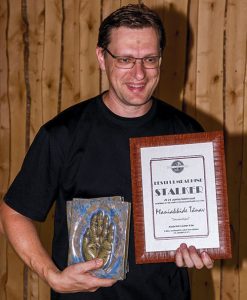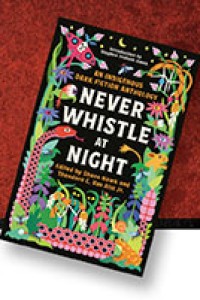Estcon 2021 Report

THIS ESTONIAN SUMMER would have been right at home at the Locus office in California: Sunny days under brilliant blue skies with just a slight breeze to keep the heat from becoming stifling. Perfect for the annual outdoor science fiction convention held at Udu Farm in central Estonia. The event wasn’t confirmed until just a few weeks before, but the vaccination program had reached full throttle and infection rates remained low, dwindling almost to zero in June and July.Estcon is remarkable in that the event is always held outdoors, come rain or shine, which means it is the only convention that has been able to convene safely during COVID times. Precautions are taken. So far, not a single COVID infection has been connected to the event.
Guests were encouraged to bring tents in order to allow the existing accommodation to be parcelled out per household. I filled my hot-pink backpack with food and clothes, slung my tent and sleeping bag into a crocheted carrier, and took the train south. This was my third outing with my tent, so I considered myself an old hand. I set up in a shady spot by a stream with only minimal cursing and swearing and very little bloodshed (I accidentally stepped on a small frog).
Udu talu, literally the farm in the mist, sits on the edge of Lake Kuremaa and consists of 12 small huts, two large houses, and plenty of space for tents and caravans. The convention has two days of straight programming, which this year was exclusively in Estonian (mainly because I wasn’t presenting).
After registration, we gathered around the picnic tables with smiles of relief: We had made it through another year. “How are you,” one young woman said to me and then cut me off as I answered that I was fine.
“No, she said. “I’m Estonian. When I ask how are you, I mean it.” She sipped her beer and looked at me. “How are you really?”
How were we, all of us, in the second year of the pandemic and all affected in different ways? All across the site, people had mirrors of the same conversation. How are you really?
A self-described Epicurean presented me with six Estonian craft beers and a bottle of Georgian wine, and the rest of my evening was spent sitting on a cottage porch, watching the darkness engulf the lake.
I returned to my tent to discover it surrounded by tiny frogs. I appeared to be on some sort of frog-migration-path, and they were everywhere. In the end, I pulled out the stakes and physically dragged my tent to the lakeside where I slept until the early morning sun blazed across the water.
By the following day, the clusters of conversation had grown smaller and more distinct. I was told in no uncertain terms that my infestation the night before was toads, not frogs. No one wanted to go see, they told me; they knew what toads looked like.
Many more people were swimming in the lake and reading underneath wooden shelters than in previous years. “I’m all extroverted out,” admitted one attendee. Another told me that although she enjoyed Friday night, after dinner on Saturday, she retreated to her room with a book. “I had enough socialization.”
Estonians are already known for being introverts; throughout the pandemic, the joke has been that the rules say everyone must keep two-meters distance, but Estonians are desperate for normal times, so they can go back to the five-meters distance they usually maintain. However, this year on the farm in the mist, it felt as though the convention’s focus wasn’t the science fiction industry but about being together, reclaiming a sense of community after the months of forced isolation.
That’s not to say that the program was lacking. Talks covered diverse subjects ranging from “Brandon Sanderson 101” to “Russian Cosmonauts” to “Zombie Training”. The storytelling workshop and trivia quiz were particularly popular. Still, the weekend felt less like a boisterous party and more like a breath exhaled after having been held too long.
We still don’t know what the world will look like post-pandemic. After the past two years, none of us can imagine our lives ever returning to the way they were, as if the virus and the lockdowns and the arguments had never happened, as if we’d never seen our hospitals overflow while splinter groups continued to insist “it’s just a flu.”
Estcon was a chance to remember that we are still a community. Even if we go through another lockdown or continue to need to maintain that distance of two meters, we still have each other. I carry that feeling back home with me as I connect with my friends around the world. “How are you? No, I mean it. How are you really?”
–Sylvia Spruck Wrigley

Stalker Awards Winners
- Best Estonian Novel: Laevakaitsjad [Ship Defenders], Maniakkide Tänav (Lääne Elu).
- Best Estonian Novella/Novelette: “Vampiiriprobleem ja selle mõnetine lahendus” [A Vampire Problem and Its Half-Assed Solution], Manfred Kalmsten (Fantaasia).
- Best Estonian Short Story: “Läbi valu ja vaeva” [Through Pain and Hardship], Maniakkiide Tänav (Gururaamat).
- Best Anthology or Collection: Eesti ulme XXI sajandil [Estonian Science Fiction in the 21st Century], Raul Sulbi, ed. (Viking).
- Best Novel (Translated): The Dark Forest, Liu Cixin, translated by Raivo Hool (Eesti Raamat).
- Best Novella/Novelette (Translated): “Alien Archaelogy”, Neal Asher, translated by Jaana Talja (Fantaasia).
- Best Short Story (Translated): “Päästke Galja” [Free Galja!], Kir Bulychev, translated by Rauno Pärnits (Gururaamat).
 This report and more like it in the October 2021 issue of Locus.
This report and more like it in the October 2021 issue of Locus.
While you are here, please take a moment to support Locus with a one-time or recurring donation. We rely on reader donations to keep the magazine and site going, and would like to keep the site paywall free, but WE NEED YOUR FINANCIAL SUPPORT to continue quality coverage of the science fiction and fantasy field.
©Locus Magazine. Copyrighted material may not be republished without permission of LSFF.







